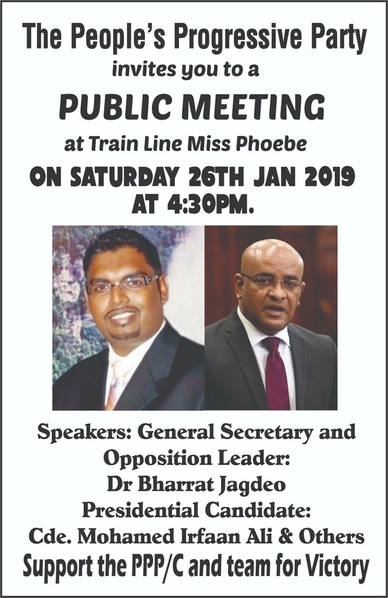Against all odds… PPP Govt will reopen sugar estates–Jagdeo
https://www.kaieteurnewsonline...ugar-estates-jagdeo/
Jan 24, 2019 | News
The International Monetary Fund (IMF) is one of the many institutions that has advocated for Guyana’s authorities to reduce the size of its sugar industry since it was too costly to upkeep production at competitive rates.
Following this advice, the APNU+AFC administration closed four estates, which displaced over 4,000 sugar workers, leaving them without a social net or programme to fall back on.
But this state of affairs could all be temporary. According to Opposition Leader, Bharrat Jagdeo, if the People’s Progressive Party (PPP) wins the next elections, its members will find a way to reopen the estates.
Jagdeo said, “The PPP will find a way of reopening the estates that are closed so as to put people back to work. We will explore all forms of partnerships to get that done plus innovative financing and investments so people can return to providing for their families.”
The PPP General Secretary said that through a series of investment initiatives and support from the treasury, the workers from the Wales Estate would benefit from the PPP Government.
He said, “We had said last year that we would also assist the sugar workers directly, that is, through a stipend. But if we can find jobs for everyone then we wouldn’t have to resort to that because they would be employed.”
The Guyana Sugar Corporation (GuySuCo) is using three estates for production – Blairmont and Albion in Berbice and Uitvlugt in West Demerara.
The remaining four estates, Wales (West Bank Demerara); Enmore (East Demerara) and Rose Hall and Skeldon (East Berbice), are up for offers of divestment and privatization.
BUILDING A RESILIENT ECONOMY
Finance Minister, Winston Jordan, had warned that it is not likely that the APNU+AFC administration would be able to build a resilient economy by the next General and Regional Elections if radical changes are not made.
In this regard, the Finance Minister, “Unless we are prepared to move away from sugar as we know it, into value added and take opportunities available in Caricom markets but more particularly Brazil, once we can get a road going there,” then the nation cannot expect a sudden turnaround in the way the economy responds to external shocks.
The Finance Minister said that to get to resilience, which means the economy can withstand shocks, Guyana would have to move away from primary production into the next stage of the value chain. He said it would also require that the Government put in place, climate resilient infrastructure and practices.
The economist said, “We just won’t move from 50 years of doing the same thing into resilience. It has to be diversified and it has to be green and withstand shocks that are ever present when you are involved in primary production.”
He continued, “Even if you were able to produce all the sugar you desired, we would have trouble because we don’t have a captive market anymore. We have to go out there and hustle like everyone else.
“At no time, certainly in the post-independence period, were we able to produce sugar at a price that could have competed on the international market.”
Jordan added, “We always had to have some form of protection along the way. We had a long protection under the European Union artificial price, which allowed us to stay in it for a very long time and perhaps it was a good or a bad thing.
“It perhaps was a bad thing in the sense that, were we forced to adjust using international prices as our benchmark then who knows; we might have been a different sugar entity today.”


